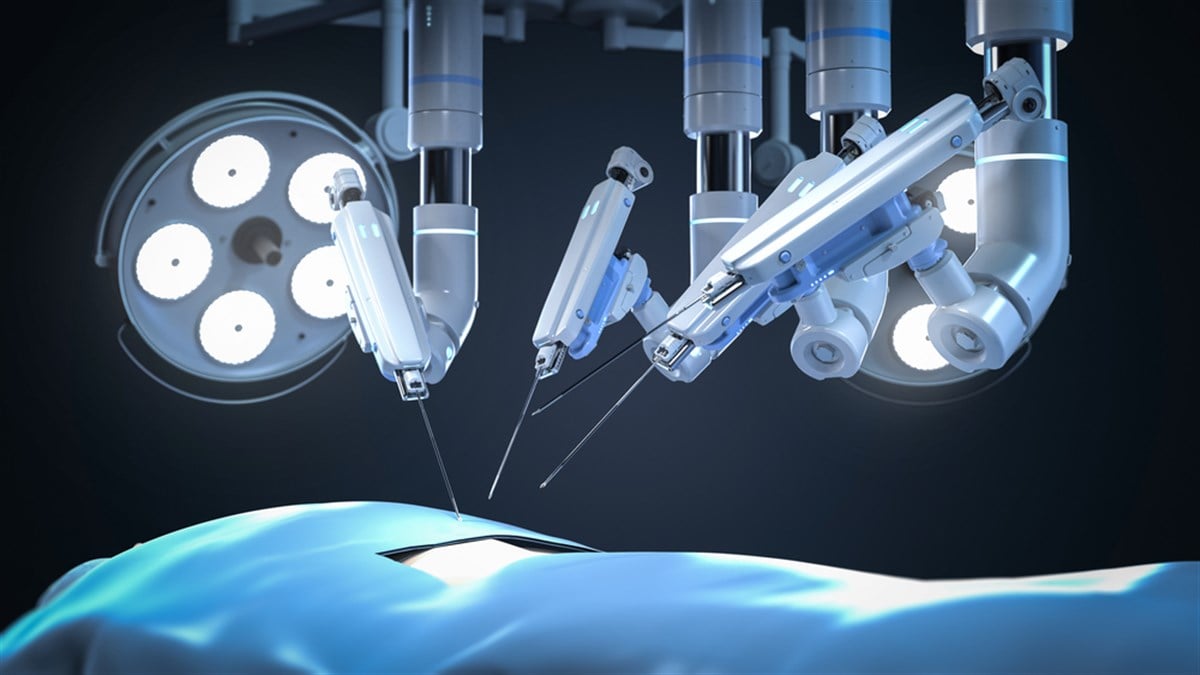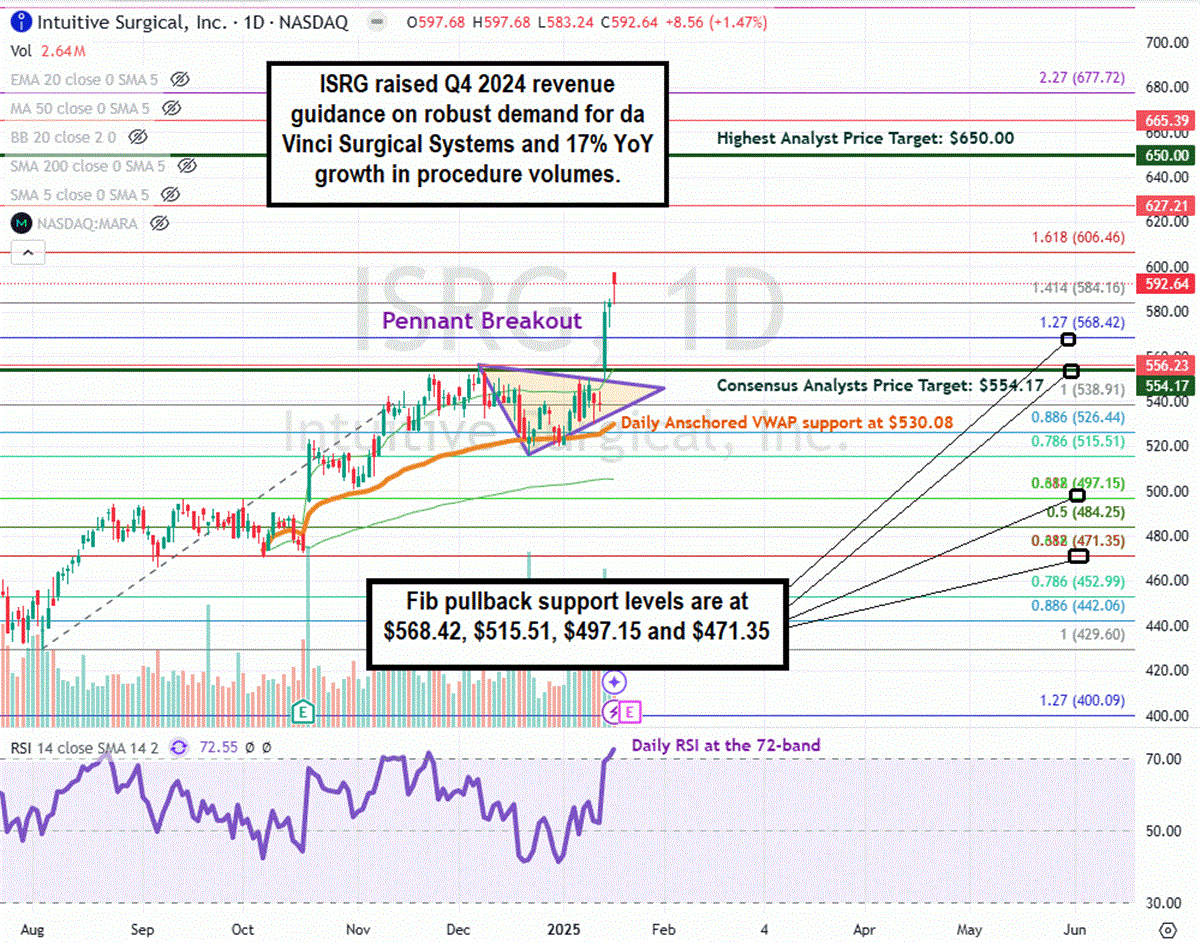
Leading robotic surgery systems developer Intuitive Surgical Inc. ISRG kicked off the new year by issuing upside guidance for its fourth quarter of 2024. Its da Vinci Surgical System has had a first-mover advantage ever since it launched in 2000, becoming the first commercial robotic surgical platform approved by the FDA. It has maintained its dominance and moat for over two decades in the medical sector, expanding its list of approved procedures for general laparoscopic surgery, which encompasses urology, gynecology, cardiothoracic, and colorectal. Shares hit new all-time highs on the upside guidance.
Empowering Surgeons Through Robotics
The da Vinci surgical system enables surgeons to perform robotic-assisted surgery. It doesn’t actually perform the procedures autonomously. Rather, it enables the surgeon to be more efficient by magnifying the field of view with 3D high-definition vision as the surgeon controls an endoscopic camera. It enhances precision with motion scaling and tremor filtration, which scales down the surgeon’s hand movement to provide finer control, ensuring smooth and precise actions. Surgeons operate from a comfortable seated position (reducing fatigue and strain) as they control the robotic arms, which provide greater reach, flexibility, and access to difficult-to-reach areas. Ion is a less expensive robotic surgical system used specifically for minimally invasive lung biopsies.
da Vinci: A Classic Razor and Blade Revenue Model
Intuitive Surgical employs a classic razor and blade revenue model with a twist. In this model, a company sells the base product (razor) for a low price or even free in order to generate recurring revenue from the sale of consumable ongoing products (blades). The twist is that the da Vinci system (the razor) costs from $500,000 to $2 million, which is a considerable investment and hardly "cheap." The surgical instruments and accessories (blades) used with the system and service and maintenance contracts ensure a recurring revenue stream.
In 2024, Intuitive Surgical sold $5.08 billion in instruments and accessories, up 19% year-over-year (YoY), driven by procedure volumes. The more surgeries are performed, the more instruments and accessories need to be replaced. The considerable investment for hospitals to purchase a da Vinci system and train its staff also creates a lock-in effect, where it would be too costly to switch to a competitor like Zimmer Biomet Holdings Inc. ZBH or leading medical device maker Medtronic PLC MDT.
Over 2.68 Million Procedures Performed With da Vinci in 2024
On Jan 15, 2025, Intuitive Surgical provided preliminary results for its fourth quarter of 2024. The company expects revenues of $2.41 billion, crushing consensus analyst estimates of $2.2 billion. Its instruments and accessories (blades) revenue rose by 23% YoY to $1.41 billion, driven by growth in da Vinci and Ion procedure volume. da Vinci procedure volume rose 18% YoY in Q4 and 17% YoY in 2024 at nearly 2,683,000.
Systems sales for Q4 rose 36% to $655 million, up from $480 million in the year-ago period. The company placed 468 da Vinci systems comprised of 174 da Vinci 5 systems. Customers can buy them outright or lease them under usage-based billing. In Q4 2024, 222 systems were placed under operating lease arrangements, of which 140 were placed under usage-based billing.
The Single Blemish: Slowing Procedure Volume Expected in 2025
Unlike during the pandemic, Intuitive Surgical had no disruptions in procedure volumes despite the resurgence of COVID-19 infections. Underlying procedure demand is healthy as the United States saw a 19% rise while international procedures rose 23% YoY in volumes. The cumulative 2024 procedure volume rose 17% YoY. However, the company expects global procedure volume to slow to 13% to 16% YoY growth in 2025. Could they be lowballing the growth? The market believes so, sending shares higher by nearly 10% to all-time highs in the following days.
ISRG Triggers a Pennant Breakout
A pennant is a symmetrical triangle pattern that forms at the end of a sharp uptrend. A symmetrical triangle is comprised of a descending (falling) upper trendline resistance converging with an ascending (rising) lower trendline support at the apex. A breakout occurs when the stock surges above the upper trendline resistance. A breakdown occurs when the stock collapses below the lower trendline support. A breakout or breakdown becomes eminent as the stock gets closer to the apex point as the channel narrows.

ISRG peaked at $556.23 highs to form a pennant pattern comprised of a descending upper trendline resistance and ascending lower trendline support. The daily anchored VWAP support is at $530.08. The Q4 raised revenue guidance surged shares through the upper trendline to trigger a pennant breakout. The daily RSI rose to the 72-band. However, the company still needs to announce its Q4 2024 earnings in full as well as provide forward guidance. It hinted at slowing global procedure volumes to 13% to 16% YoY growth in 2025. Fibonacci (Fib) pullback support levels are at $568.42, $515.51, $497.15, and $471.35.
ISRG stock’s average consensus price target is 6.5% lower at $554.17, and its highest analyst price target sits at $650.00. It has 15 Buy ratings, three Hold ratings, and one Sell rating from analysts. The stock has a 1.24% short interest.
Actionable Options Strategies: Bullish investors should wait for the reaction to the actual Q4 2024 earnings release and can consider using cash-secured puts at the Fib pullback support levels to buy the dip. If assigned the shares, then writing covered calls at upside Fib levels executes a wheel strategy for income.
The article "Intuitive Surgical Leads the Pack in Robotic Surgery Innovation" first appeared on MarketBeat.
© 2025 Benzinga.com. Benzinga does not provide investment advice. All rights reserved.
Trade confidently with insights and alerts from analyst ratings, free reports and breaking news that affects the stocks you care about.